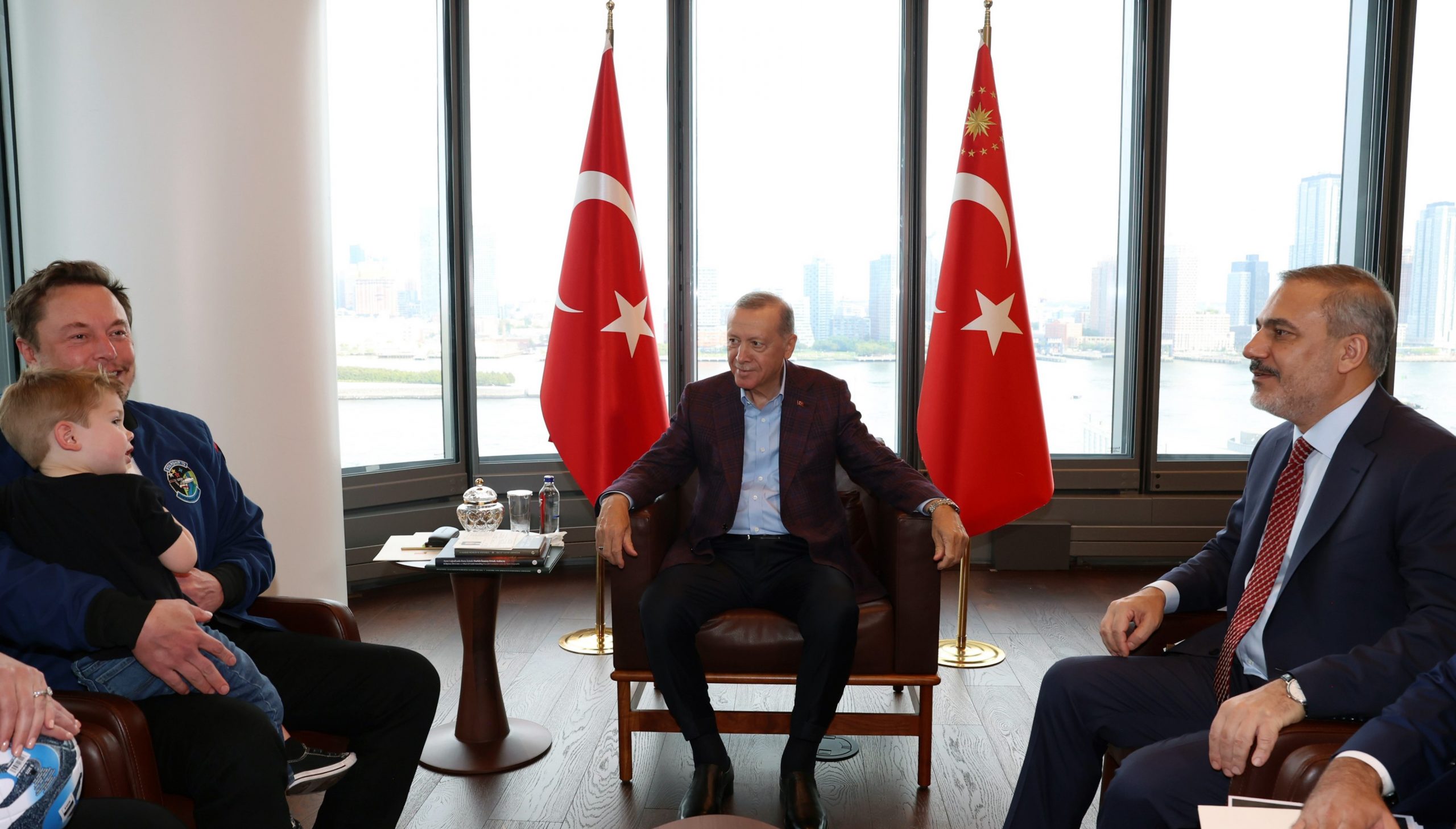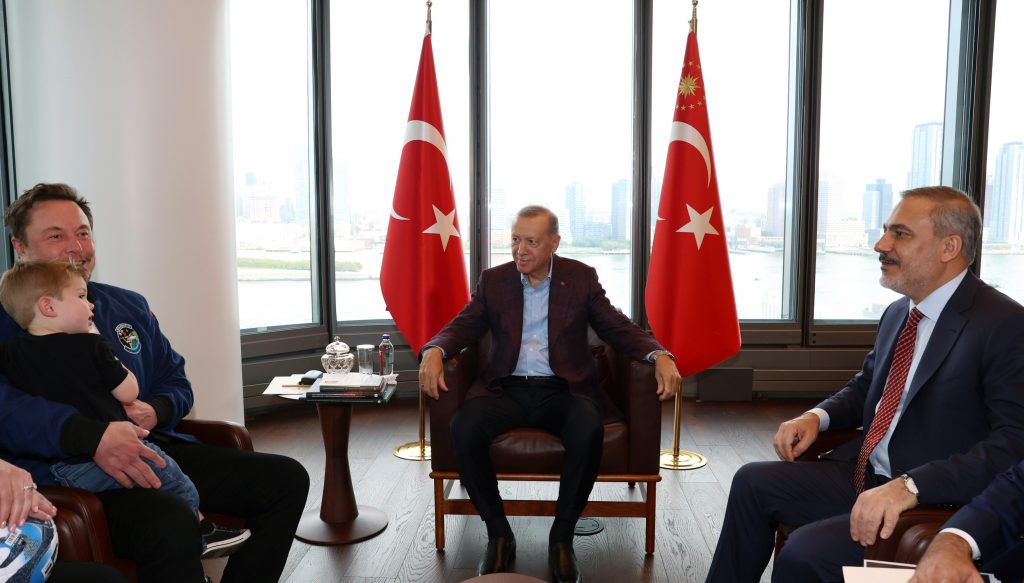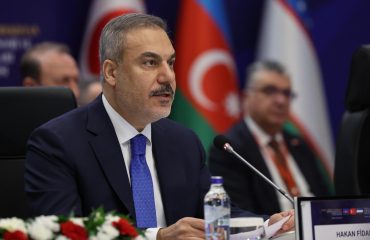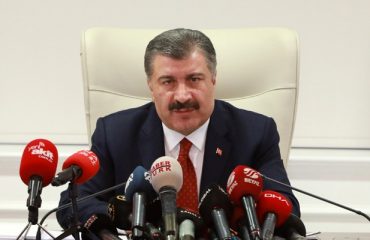

President Erdoğan’s first meeting in the US was with Elon Musk, who came to the meeting with his child, and Erdoğan asked for a Tesla factory. Erdoğan is also expected to meet with Israeli Prime Minister Netanyahu and Greek Prime Minister Mitsotakis in New York. The Biden meeting is not yet on the schedule. Will Erdoğan’s threat of parting ways from EU yield result? (Photo: AA)
When President Tayyip Erdoğan mentioned the possibility of Türkiye parting ways with the European Union on his way to New York for the United Nations General Assembly, no one from the EU has so far said “Don’t go, stay; we’ll give you what you want”.
Perhaps there is an expectation among the Turkish President and his close circle that the EU leaders will give Erdoğan the message “not without Turkey” during the bilateral meetings to be held during the UN Assembly.
Israeli Prime Minister Benjamin Netanyahu and Greek Prime Minister Kyriakos Mitsotakis stand out in Erdoğan’s meeting program. A meeting with US President Joe Biden is not yet on the programme.
Of course, Erdoğan has the challenge of asking the West for money and trying to scold them at the same time.
On his way to the last NATO summit in June, he added, at the last minute, to the list of conditions for Sweden’s membership the reviving membership negotiations with the EU, which raised hopes in Türkiye that the Customs Union would be renewed and the visa difficulties would be solved.
Within two months, the condition to revive the negotiations turned into a threat to part ways with the EU. Didn’t anyone tell the President that the circles in the EU that don’t want Türkiye in the union have been waiting for years for Türkiye to be the one to break the ties?
The threat of parting ways is serious
Namık Tan, the main opposition CHP’s new foreign policy voice, who has managed to keep himself away from internal party squabbles, said in an interview that “Erdoğan cannot leave the EU table; Europeans will not take his words seriously”.
However, I think there is something else very serious about Erdoğan’s threat of parting ways with the EU: Türkiye’s president is increasingly becoming a man whose harsh outbursts echo in the void and fizzle out.
Hakan Fidan, İbrahim Kalın, and the new National Security Advisor, Çağatay Kılıç, have more than enough knowledge and skills to see this direction. Why don’t they see it and warn the president about it?
With this policy, Türkiye may lose its unique strategic position in Russia’s war against Ukraine.
While being busy persuading Russia, new routes have already been found to ensure Ukraine’s grain exports, which Russia cannot block without entering the territorial waters of NATO members, creating a potential war.
I’m not just talking about river ships reaching the Mediterranean ports of Croatia via the Danube; its transportation capacity is limited. But the route from Ukrainian ports, NATO member Romania, Bulgaria, and the Turkish coast to the Bosphorus and the Mediterranean is already in operation.
Will NATO be next parting ways?
Türkiye has geopolitical weight, and this weight should not be diminished by unrewarding outbursts, such as threatening to part ways with the EU.
It is true that Türkiye has seized a window of opportunity with the conditions it has put forward for Sweden’s NATO membership, especially with regard to the fight against the PKK; any other country would use this opportunity.
But can Erdoğan impose the same conditions on the US, which openly provides arms, money, training, and protection to PKK affiliates in Syria? He couldn’t have bilateral talks with US President Joe Biden outside international summits; he didn’t have that at the G20 either. It was not enough for him to reconcile with Egyptian President Abdel Fattah Sisi, whom he resented as a putschist and murderer; he had to say that he and Biden “had a meeting, albeit on foot,” and there was not even the usual statement from the US.
If the threat of parting ways with the EU fails, will Erdogan’s next move be to threaten Türkiye’s parting ways with NATO?
Walking away cannot be seen as the only way to emphasise its importance.
Crime and punishment
When I read the title of Erdoğan’s speech to the Turks living in the US in New York, “Every crime that goes unpunished makes the perpetrator rampant,” I honestly thought to myself, “He is confirming those who say that he speaks differently in Türkiye and differently abroad.”
Was Erdoğan sending a message of political change in parallel with Treasury and Finance Minister Mehmet Şimşek’s efforts to convince Western investors after Gulf investors, “Look, we have changed; we are playing by international rules again; we expect investment”?
For example, was he alluding to the era of Süleyman Soylu, the predecessor of Interior Minister Ali Yerlikaya, and saying that the gangs, who were counting on impunity, were now being cracked down on and that he had decided parting ways with the mob that had been tolerated until the elections? Maybe he was going to talk about forgiving the tax debts of crony business groups and not burdening fixed-income earners with more taxes while he was in New York to meet with investors.
No, the Turkish President was talking about crimes of “Islamophobia”. He was warning that countries that condone Islamophobia will pay dearly for it.
A return to “precious solitude”?
Once the idea of parting ways has entered the mind, the next step can go to asking “Why not?”, then “It’s due”, then searching “Where else?” and the arrogance of “It’s up to them”.
Or, I will say, “Are we going back to the politics of precious solitude?” But in the summer of 2013, when this thesis was put forward, inflation was 7.5 percent, and Prime Minister Erdoğan considered the increase in the dollar exchange rate from 1.89 liras to 1.92 liras due to the Gezi protests, which he saw as a coup attempt, as evidence of treason and a coup.
Today, ten years later, the dollar exchange rate is around 27 liras, the official year-end inflation expectation is approaching 70 percent, and Erdoğan has convinced Şimşek, whom he had fired five years ago, saying, “This is not the way to do it” and talking behind his back, to take his job again, and he has pinned his hopes for foreign investment on him.
I repeat, but it is as if we are trying to ask the West for money and at the same time try to scold them; it is a difficult task.


